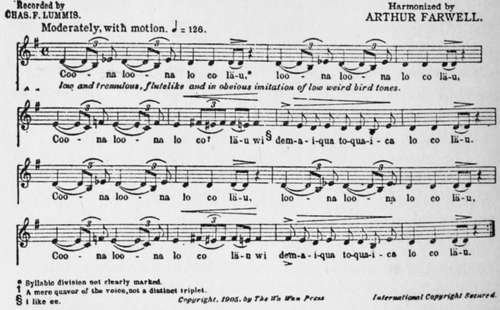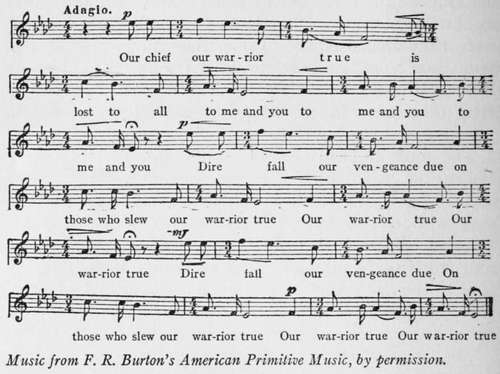The Scalp Dance
Description
This section is from the book "The Book Of Woodcraft", by Ernest Thompson Seton. Also available from Amazon: The Book of Woodcraft.
The Scalp Dance
If the assemblage is mixed, each brave selects a squaw for this, ten to thirty couples taking part; otherwise, twenty braves can do it. They come out of the woods in procession, form a circle about the fire; standing with both hands raised they look upward and sing the Omaha Tribal Prayer (see page 145). They sit in a large circle, alternately brave and squaw. Each squaw has a club by her side.
Squaws begin to sing the Coona song (Cahuilla Bird Dance Song) (next page) or Omaha Love Song (p. 50, Fletcher), guided by Medicine Man and drum.
Bird Dance Song. Cahuilla Tribe

At length the song stops. Squaws begin nudging the braves and pointing forward. New music by the Medicine Man begins. The Zonzimondi, The Mujje Mukesin* or other dance song. The braves jump up, dance around once, with heads high in air, almost held backward and not crouching at all. (They carry no clubs yet).

* This Moccasin Song is from Fred R. Burton's American "Primitive Music," 1909.
There are many fine airs and dances in Alice C. Fletcher's " Indian Story and Song," Small, Maynard & Co., 1900 ($1.00).
After going once around, each is back again near his squaw, and she holds out to him the war club and utters the little squaw yelp. Each brave takes his club, and now begins the crouch dance. Going three times around, and each time crouching lower while the squaws stand or sit in a circle, arms down tight to side, but bodies swaying in time to music. In the fourth round all are crouching very low and moving sideways, facing inward.
The music suddenly changes, and all do the slow sneak toward the centre with much pantomime. The squaus watch eagerly and silently, leaning forward, shading their eyes with one hand. All the braves strike the fire together, utter the loud war whoop, and stand for a moment with hands and weapons raised high, then, in time to the fast drum, dance quickly erect with high steps and high heads to the squaws who utter the squaw yelp for welcome, and all sit down as before.
The squaws begin the singing again, repeat the whole scene, but this time the chief falls when the block is struck, and is left lying there when the other braves retire.
His squaw stands up, and says: "Mee-heheenna tuk-tay-ay-hay natang ee-tang-chang-keeng." ("Where is my chief, he who led you to battle?")
All look and whisper; his wife gets up to seek. Soon she finds him, and flinging herself on his breast with clasped hands, breaks forth in the lament for the dead, which is a high-pitched, quavering wail. The warriors lift him up and slowly carry him off the scene, out of sight, followed by the squaws, who, with heads bent, sing:
The Lament

Repeat it many times; as they disappear, the music dies away, fainter and fainter.
If no girls take part, let the braves enter in procession, singing, and carry their clubs throughout, and at the end one of them made up like an Indian woman goes out and finds the dead chief.
Continue to:
Tags
bookdome.com, books, online, free, old, antique, new, read, browse, download
